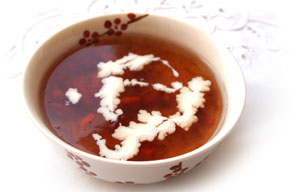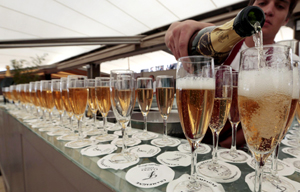
 |
|
A well-dressed duck, boned and stuffed with a taro paste. [Photo by Fan Zhen/China Daily] |
While I am pretty sure the chef does not fish for his prawns in the Lijiang River running just outside his hotel, those we next see on our table are prettily pink and beautifully presented.
They are crisp, flavorful and addictive, beer food at its best. The platter goes just as well with our osmanthus tea, and the luohanguo infusion we are served with as soon as we settle at table.
Luohan is the Chinese name for the arhats, the semi-saints of Buddhism. There are many stories on why the brown and bald fruit, actually a gourd, is so named, but we will not go into that here.
Instead, let me tell you that the luohan fruit is going to be the next big thing as a natural sweetener, right there with the currently popular herbal sugar substitute, stevia.
Its sweetness is scented with a fruity fragrance and the locals drop pieces of luohanguo into almost everything they drink from hot water to tea to the local herbal tonics traditionally used to dispel the summer heat.
The Sheraton in Guilin is one of the first, and now its oldest, international five-star hotels, and that it has stuck to its benchmarks is apparent from the offerings at its signature Chinese restaurant.
And while we have homebred chefs like Huang guarding Guilin cuisine, we can be sure that here at least, the legacy is safe.

2013 Chinese New Year |

Hidden dragons, crouching tigers |

Soap beans, silver ears and peach gum |

Special:Winter Solstice |

Oysters draw thousands to Bluff, New Zealand |

Int'l Tea Convention opens in Pu'er, SW China |

'Wembley winner' pastries in Dortmund |

Champagne feast during Cannes Film Festival |